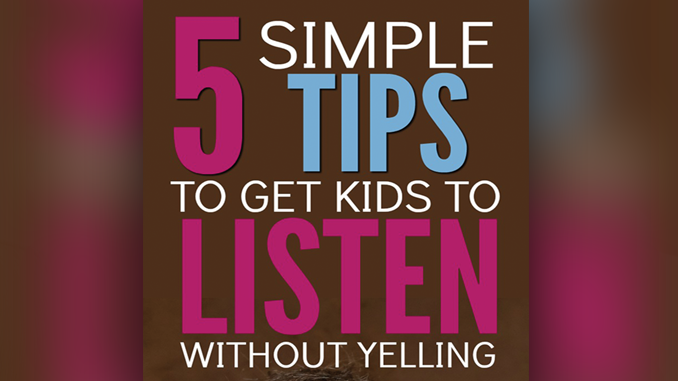Many parents confess to yelling at their kids upwards of ten times a day.
Parents say they do this most of all because they want their children to listen but they get zero cooperation. When promises, pleading and threats no longer work, yelling can feel like the only option. Especially if time is short, behaviors are out of bounds, and big power struggles break out yelling becomes the go to way to get kids to start listening.
The problem is that yelling at kids really doesn’t help them focus on what you want them to do.
Why this backfires:
A natural defense mechanism for children is to “tune out” yelling. It’s a highly charged input. Children might yell back or they might even laugh in response, but they aren’t internalizing the message. Frequent yelling can trigger symptoms of anxiety in children and can lead to a negative cycle of communication that is difficult to break.
Here are some pro-active strategies to try if you want to reduce yelling and encourage your kids to listen and cooperate:
Set limits early on
Sometimes we dread the potential tears, conflict or protest that may come with setting a limit, so we avoid setting the limit in the first place. The problem? This practice of avoidance until the last minute leads to frustration and resentment on our part. Then we yell and our child startles, cries or disconnects.
Setting a limit sooner means the problem is eliminated well before it grows and
triggers yelling.

Setting limits sometimes means children feel upset. Keeping limits however helps children learn to trust our guidance. While we cannot own or change our children’s feelings, we can strive to accept them, empathize and lead confidently.
It’s very helpful to validate feelings and then trust that your child will be able to feel her feelings and move on. Here is a conversation I had with my four year old recently:
me: “Can you please set the place mats on the table?”
four year old (with creative excuses): “Oh..but my legs hurt! And I’m playing with my playmobil!”
me (showing interest): “Oh no, your legs hurt? What’s going on with them?”
four year old (being honest!): “Ugh, I just don’t feel like table setting mama. it’s so boring!”
me (validating): “uhm.uhm..you don’t feel like it. It is boring. I understand. And it’s dinner time. So what’s your plan to get your job done?”
four year old: “I don’t wannnna. I don’t mama.”
me: “it’s a boring job. you don’t want to do it. Could you make it a fun job?”
four year old (understanding my request wasn’t changing): “Can my playmobil princess do it? You, know, with my help?”
me: “yes!”
Adjust expectations
Young children touch everything, preschoolers ask WHY around 300 times a day, school aged children often have no interest in doing homework when WE think it’s the time to do it. When expectations are in line with our children’s abilities (in that moment!) the better they can follow through with our requests and yelling is no longer necessary.
Ask questions that invite cooperation
Questions can motivate kids to take ownership over their own tasks. What do you still need to do before ________?” is one favorite way to motivate children. This kind of question works because it invites cooperation while still allowing children to feel capable and competent.
In practice this means that “WHY HAVEN”T YOU BRUSHED YOUR HAIR YET AND WHERE ARE YOUR SHOES, OMG WHY ARE YOU NOT MOVING YOUR FEET…. LET’S GO!!!!!” simply becomes “What do you have left to do before leaving the house?”
This works because “Yelling grows children’s defenses while clever language grows their cooperation.”
Connect before making a request
Children are much more likely to follow through with a request when it is done face to face, even better at or below their eye level. This is a very safe and connected way to make a request. What’s more, when you speak kindly you are modeling a wonderful way for your child to interact with classmates, siblings, teachers and friends.








